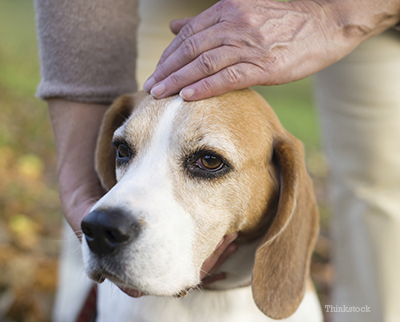
Dr. Justine Lee discusses living wills for pets. For more from Dr. Lee, find her on Facebook or at www.drjustinelee.com!
As an emergency critical care veterinary specialist, I see a lot of really sick pets in both the emergency room and intensive care unit (ICU). Occasionally, some of these pet owners will put their pets through – in my opinion – way too much despite the poor prognosis. Likewise, I’m often presented a pet who was brought in by a pet-sitter. The pet-sitter has no idea if she should authorize care for the pet or take financial responsibility (e.g., leaving the deposit for care for the pet at the veterinary clinic), as they don’t know what the pet owner may have requested in terms of medical care.
Having observed this, I decided to create a living will for both my pets and myself. That way, if I’m away on a business trip, my pet-sitter will have a detailed plan of action of how to care for my four-legged family member. Maybe it sounds neurotic, as most pet owners don’t go into this amount of detailed planning when leaving their four-legged friends for a few days.
But they should.
Likewise, if you take your dog to doggy daycare routinely, a living will is a must! In case of a medical emergency, you want a responsible doggy daycare that has specifically outlined emergency contact information, credit card information, veterinary contact, and authorization for a certain amount of life-saving care (e.g., up to $500, up to $1000 without verbal authorization, etc.). In fact, if your doggy daycare doesn’t ask for this up front, find another place! Your pet isn’t in safe hands!
I’m often shocked that most pet owners aren’t aware that they can set up a living will for their pets. I’m a huge advocate of this, for both 2-legged and 4-legged creatures alike. Living wills should include a detailed list of resuscitation orders, including the following:
- If you want your pet intubated (where a breathing tube is placed) or placed on a ventilator/respirator under anesthesia
- If you want CPR performed on your pet (keeping in mind that once an animal cardiac arrests, the prognosis, outcome and survival is very, very low)
- If you want a temporary feeding tube placed (to supply calories)
- If you want your pet to receive certain life-saving drugs (e.g., like vasopressin, atropine, epinephrine, dopamine, etc.), blood transfusions, or emergency surgeries.
What do I do? I store my pets’ living wills in the electronic medical record at the veterinary hospital, so everyone knows where that information is. It’ll only take a few minutes to create, so just do it. Here’s an example:
I, Jane Smith, authorize life-saving care for Fido in the event of an emergency. This includes emergency surgery and life-saving treatment (such as blood transfusions, CPR, life-saving drugs). Medical care up to $3000 is authorized.
However, if the prognosis is poor, or my pet is in significant, life-threatening pain that cannot be medically managed, I authorize humane euthanasia.
When you create a living will, it allows your family, pet-sitter, veterinarian, emergency veterinarian, and friends to know how to respect your wishes in the extreme, rare situation where they can’t get in touch with you during an emergency. No one wants that situation, and you can avoid it by simply creating a living will. While it may sound neurotic to some, it may safe your dog or cat’s life.
If you have any questions or concerns, you should always visit or call your veterinarian – they are your best resource to ensure the health and well-being of your pets.
